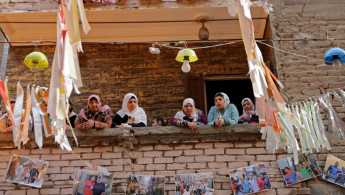Naira Ashraf's murder must be the last: Egyptian women's rights activists
The gruesome murder of an Egyptian university student in daylight must be the last straw in a toxic male-dominated society where violence against women is not fully criminalised, a number of high-profile women's rights advocates in Egypt have said.
Earlier this week, a university student stabbed his classmate, Naira Ashraf, to death and then slit her throat in broad daylight outside Mansoura University, located northwest of the Egyptian capital of Cairo. The victim was in her early twenties.
The perpetrator confessed to the murder to authorities and said the reason was that Ashraf had repeatedly turned down his marriage proposal.
"It may seem a crime of passion on the surface. But it, actually, revealed societal endemic ills," prominent political sociologist Said Sadek told The New Arab.
"The incident spotlighted the violence and injustice women are subjected to in the absence of deterring laws or religious and social awareness that could confront regressive thoughts," said Sadek, who is also a feminist.
Seham Ali, lawyer and board member of the Center for Egyptian Women's Legal Assistance, agrees with Sadek.
"We witnessed some reactions to the murder that nobody could've ever imagined. This crime is the law straw, a warning that there must be a decisive action to protect women in the society," Ali told The New Arab.
"It is time for a law to be enacted to confront violence against women, socially and family-wise. There is no definite law on this purpose, only some articles within some laws," she added.
In the few days following the incident, a further debate erupted on social media regarding the victim not abiding by the Islamic hijab, whether she does not deserve God's mercy and whether those unveiled could meet the same fate for wearing ordinary or revealing outfits.
Mabrouk Attia, a preacher and professor of Islamic Sharia at Al-Azhar University, said in a video released on social media demanding women "to fully cover up" or else "meet the same fate" as the Mansoura University victim.
"The horrific incident highlighted the dreadfulness of the religious discourse of extremists and the masculine obsession of covering women up. So it's not OK to seek mercy for an unveiled woman, while at the same time, advocating for the culture of suppressing women in the name of religion," Sadek remarked about the preacher's comments.
A number of women's rights supporters as well as the National Council for Women were quick to condemn Attia's statements and filed official complaints before the prosecutor general, accusing him of several legal offences, among them were "inciting hate speech and violence against women."
"There is a citizen named Mabrouk Attia, who claims to be a sheikh, asking girls to wear 'tents' in order to preserve themselves. He justifies the murder of the Mansoura University girl that this is the nature of the Egyptian society," renowned lawyer Nehad Aboul-Komsan said in a video shared online addressing the prosecutor general and her followers.
"If women are required to protect themselves [as he said in the video], then there are no laws or a constitution," she said.
"We won't wear 'tents' or live in ones…I speak as a mother of two daughters and in my capacity as the head of the Egyptian Centre for Women's Rights," she added.
After being faced with widespread criticism, Attia, a common face on TV, appeared in another video and declared he will take an indefinite time off and may not even appear publicly ever again.
Azhar institution released a fatwa (religious edict) on Facebook in what seems to be a response to the ongoing debate in which it denounced any justification for killing women.
In the written fatwa, Azhar noted that "it is religiously prohibited to underestimate a woman, whether veiled or unveiled, and taking that as an excuse to assault her is a heinous crime."
"After this wake-up call, now what? Will laws be amended? Will those in charge consider threats ahead of women and work on the ailing male-dominated culture? Will TV channels quit hosting extremist Islamic preachers who talk about women for some time until fatwas against women are purged?" Sadek wondered.





 Follow the Middle East's top stories in English at The New Arab on Google News
Follow the Middle East's top stories in English at The New Arab on Google News
![Netanyahu furiously denounced the ICC [Getty]](/sites/default/files/styles/image_330x185/public/2024-11/GettyImages-2169352575.jpg?h=199d8c1f&itok=-vRiruf5)
![Both Hamas and the Palestinian Authority welcomed the ICC arrest warrants [Getty]](/sites/default/files/styles/image_330x185/public/2024-11/GettyImages-2178351173.jpg?h=199d8c1f&itok=TV858iVg)
